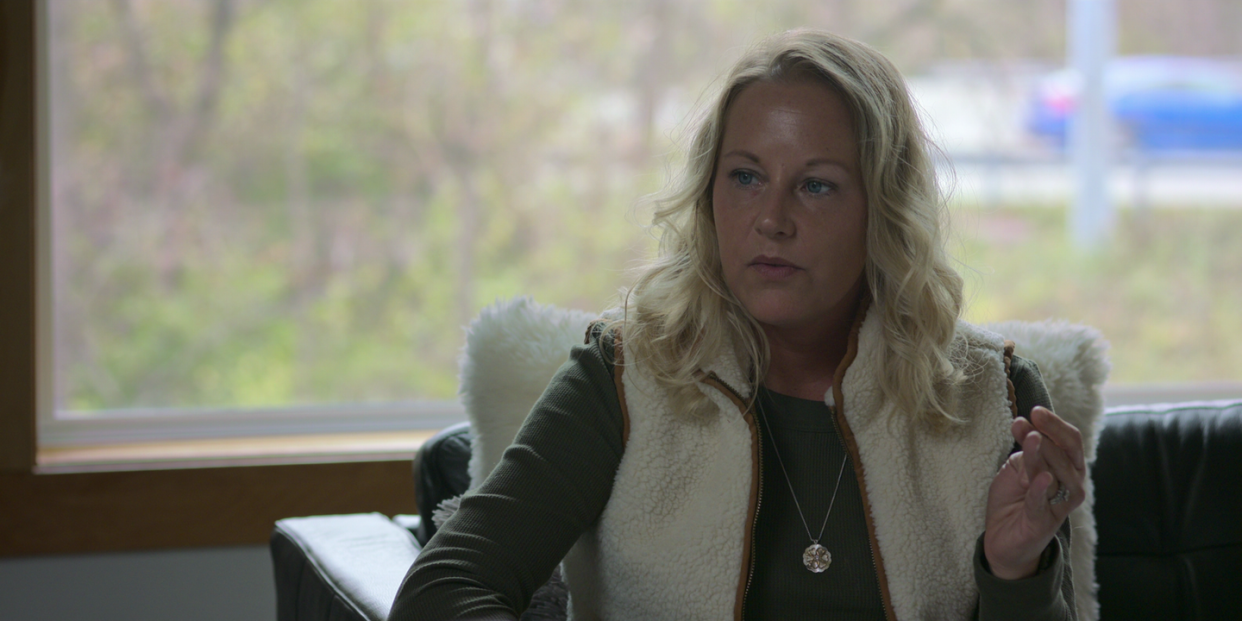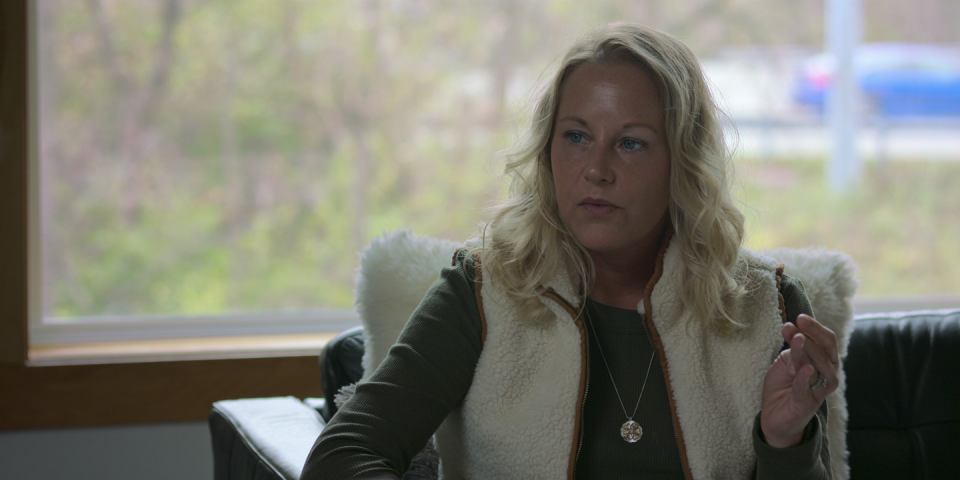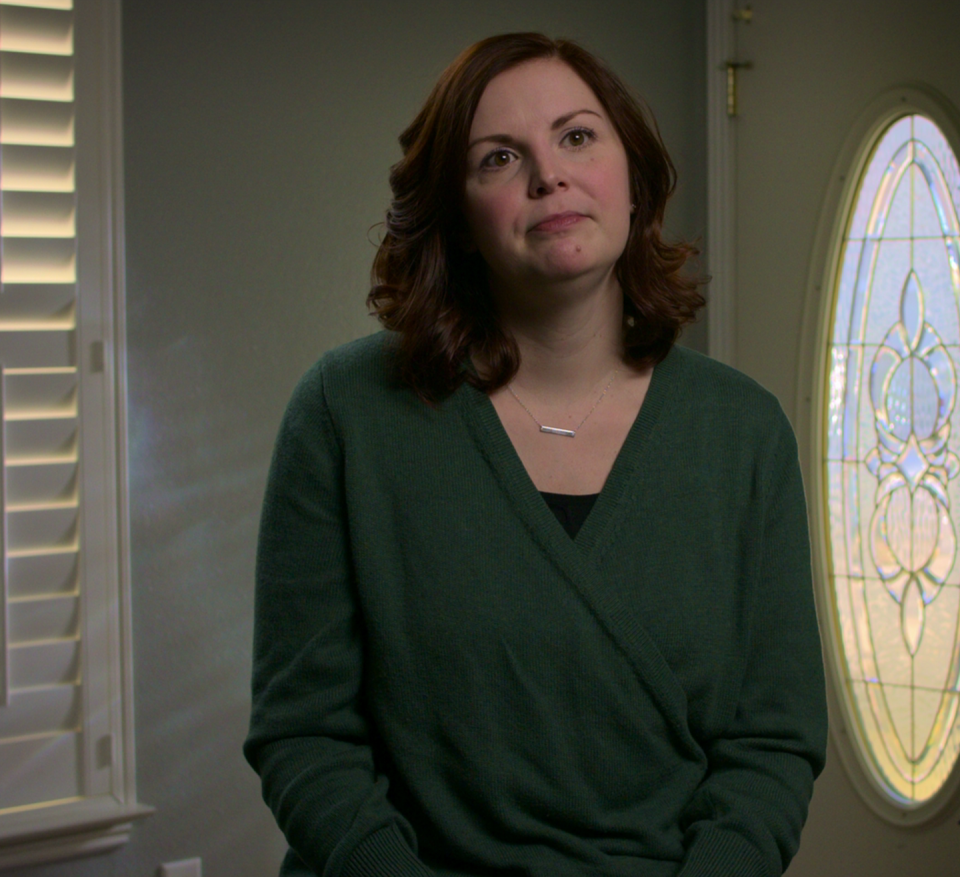Jacoba Ballard Wants 'Our Father' To Improve Fertility Fraud Laws

Netflix's latest true-crime documentary Our Father unpacks the case of former fertility doctor Donald Cline. For years, Cline fathered dozens of his patients' children in secret, using his own sperm to inseminate women, instead of donor sperm. When his actions were finally exposed, it kicked off a massive chain reaction—one that eventually made it all the way up to the state legislature.
The film follows Jacoba Ballard, one of Cline's children who was the first to ultimately discover his actions. When a DNA test told Jacoba she had seven relatives in nearby parts of Indiana, she knew something was wrong. Since then, it's been confirmed that Cline fathered over 90 children.
The documentary's ending leaves a lot of questions (like what happened to Cline? And how did this happen in the first place?). But viewers are also curious to know more about the woman who brought the story to light. So, Jacoba and one of her half-sisters, Heather Woock, sat down with Women's Health to talk.
Here's everything you need to know:
Jacoba says when she finds new half-siblings it gives her a 'sick feeling.'
"It was a sick feeling," Jacoba tells Women's Health of the emotions she feels whenever DNA results revealed proof of another half-sibling. "One, you're having to relive the whole thing. And two, it's almost like you know that you're ruining their life, and then you're going to turn around and support to help them rebuild it."
But Heather says that when Jacoba and another half-sister first reached out to her, all she felt was disbelief. Heather had sent her DNA test years ago to learn more about her ancestry, so receiving a message from Jacoba was not exactly what she expected. "I called my mom and I was like, 'Mom, is it possible I have random siblings out there somewhere?'" Heather says. "She was like, 'I don't know what you're talking about.'"
"At that point, I just didn't think it was real," Heather adds. "This is so weird," she remembers thinking. "What kind of scam is this?"
But eventually, "I dove right into investigating what this actually meant and within a couple of hours realized they were very much accurate, that I completely was their sister."
Jacoba felt she had to expose Cline to let all of Indiana know what he'd done.
Jacoba's decided to bring her story to reporter Angela Ganote because she knew she had to find the other families Cline had affected. "It's so messed up," she says of his actions.
"That's all I could keep thinking about was my mom was laying there, 20 years old, and this man who was the age of my grandparents took advantage of her. And, I don't know, that time, I just, I said, 'I bet there's hundreds of us.' And I wanted everyone in the state of Indiana that had ever went to him to be aware and to know."
Jacoba also says she felt the need to let other half-siblings know they were related. As the film explains, it was important to Jacoba that she spread the word to prevent any marriages or offspring between relatives. "You could say it's a health crisis," she says.
Cline has had minimal contact with Jacoba.
In the film, Jacoba says she met Cline in person and also took phone calls from him early on. He asked her not to speak to the media about what he'd done and said he didn't think his actions were wrong.
But since those initial conversations, she says Cline hasn't attempted to contact her again.
Jacoba is still struggling with her health.
In Our Father, Jacoba explains that she's sick but can't get a diagnosis. To this day, Jacoba's still battling her symptoms, and she also says she's not the only half-sibling with health issues. "I'm doing better than last year. Last year was really bad," she tells Women's Health. "There was a period of time, I didn't know if I was going to make it. I really thought I was going to die."
Doctors still can't diagnose her. And it doesn't help that the whole experience has made her wary of doctors in the first place.
"It makes me wonder," she says, "if I actually got proper medical treatment. It's kind of scary to have to go to a doctor and wonder if you're actually going to be treated properly because of what [Cline] did."
She says that she's had some doctors who "looked at me dead in the face and said they don't understand what he did was [wrong]—they were in support of him."

The documentary hasn't changed much for Jacoba and Heather—yet.
Since the film's release Wednesday, neither Jacoba nor Heather have heard from any new potential half-siblings. However, Jacoba notes that it usually takes about eight weeks for DNA results to come back, so it's possible that more half-siblings will pop up in the coming months.
"We find new siblings regularly, especially after major holidays because DNA testing kits are big gifts," Heather says. "We just had Mother's Day last weekend, so I'm sure that even just as a result of that, we'll find another sibling or two."
Both also say their parents were beyond supportive of their decision to take part in the documentary. "It was much tougher to break the news to my parents that Cline is my biological father than it was to tell them about the documentary," Heather tells Women's Health. "They have been incredibly supportive of me doing whatever I needed to do as part of my processing and healing process."
Jacoba says she's "excited" about Our Father, "more so for awareness." "I keep thinking maybe the state of Indiana will kind of see their faults as well," she says, referring to the lack of a fertility fraud laws that enabled Cline to skip jail time for his actions.
"It took a lot of guts and emotion for us to participate in this documentary," Heather adds. "It's exciting that the fruits of those efforts are now available for everyone to see, but it's also nerve-wracking because everyone can now see."

Now, the pair is focusing on advocacy efforts.
After filming, the half-sisters threw themselves into local advocacy work. They lobbied their state legislature, did interviews, and worked with NPR to create a podcast about their experiences called Sick.
Now, Jacoba is an advocate for donor-conceived people. She works with the group Right To Know, which pushes for fertility fraud laws, as a mentor. And now that Indiana finally has a law that makes fertility fraud a felony, Heather says other states are passing similar bills. "While we would love for there to be something at a national level, it is nice to see it kind of trickling across the nation."
Colorado is also getting ready to enact a law that will ban anonymous sperm and egg donations starting in 2025, according to Colorado Public Radio. Fertility clinics will be required to keep records and make sure that no single donor is used for more than 25 families in and outside of the state.
"It doesn't feel like a brand new spotlight on this," Heather says, "but it's certainly bigger and brighter now."
"Honestly, I'm kind of thankful for it. It brings awareness on this huge platform," Jacoba adds. "I have read people saying they weren't even aware of him and they live in the state of Indiana. So I'm hoping it reaches more people, more patients."
You Might Also Like

